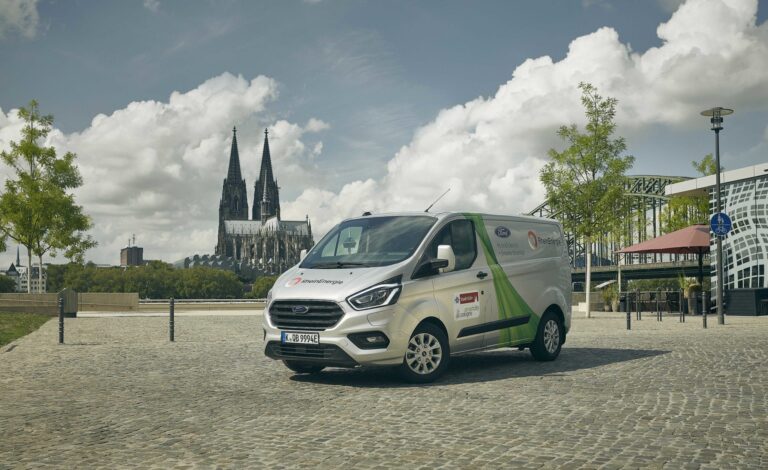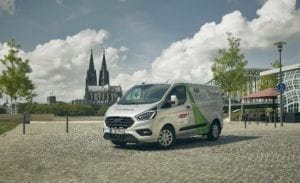Ford has extended its European plug-in hybrid-electric vehicle (PHEV) trial to Cologne, Germany, to better analyse and show the real-world benefits of such vehicles for the environment and for commercial vehicle owners and operators.
Working with five municipal fleets and the City of Cologne, nine Ford Transit Custom Plug-In Hybrid vans and one Tourneo Custom Plug-In Hybrid people-mover will be tested in a variety of real‑world use cases.
Ford will also investigate how geofencing and blockchain technology could help to accurately track and increase the number of green miles driven by vehicles.
“Ford is committed to delivering new, more environmentally sustainable vehicles that can help address the mobility challenges our cities face,” said Mark Harvey, director, commercial vehicle mobility, Ford of Europe.
“The PHEV trials with the City of Cologne builds upon our ongoing electrification programmes elsewhere in Europe, and bring us all closer to meeting our combined urban air quality goals.”
Each of the 10 PHEVs in the 12-month Cologne trial features the FordPass Connect on-board cellular modem, and a plug-in device that enables the geofencing and blockchain capabilities. Whenever a trial vehicle enters a controlled zone, its electric-drive mode is triggered and the zero-emission driving miles are documented.
The emissions mode and time that vehicles enter or leave a controlled zone are recorded to a secure distributed ledger – a blockchain – ensuring emissions data is safely stored and shared among relevant parties including city authorities and the vehicle or fleet owners.
The geofencing technology also means the vehicles can adapt in real time to changes in emissions zones. For example, cities may choose in the future to adjust controlled areas or create new ones based upon local weather or environmental conditions. The connected PHEVs will then automatically switch to low-emission mode when they enter these updated zones.
“The blockchain technology we are testing in Cologne enables secure, tamper-proof tracking and logging of vehicle emissions records, which makes it ideal for the PHEV pilot,” said Gunnar Herrmann, chairman of the management board, Ford-Werke.
“Security, trust and transparency of emissions data are of paramount importance to all stakeholders in this project, and are key for our vision of cleaner air in the city.”
The project also sees Ford become an official partner of SmartCity Cologne. Initiated by the City of Cologne and regional energy supplier RheinEnergie, SmartCity Cologne is a cooperative platform for partners throughout the region to pilot technologies and services that promote climate protection and energy transition.
“Cologne will keep its drive in the future. And it will be emission-free,” said Henriette Reker, lord mayor of the City of Cologne. “Transforming our city fleets and using climate-fair vehicles is a matter of high priority to us. After all: if we don’t follow our own guidelines, why should our citizens?
“Public administration and city council have passed the climate emergency for good reason – and we will therefore consistently pursue this decision to improve the quality of air and the quality of life in our city. Our goal is to achieve the best possible solution for climate-friendly mobility in all areas.”






